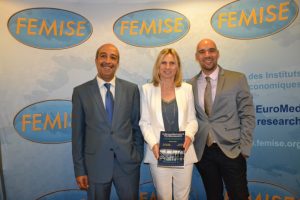
From Left to right: S. Mouley, P. Augier and C. Tsakas, authors of the report
As pointed out by the Femise report “The private sector in Mediterranean countries – Main dysfunctions and opportunities for social entrepreneurship”, it is only through the development of the private sector that jobs will be created in the southern Mediterranean. The document also recommends promoting the development of social entrepreneurship.
“The main priority for young people in these countries remains job creation. The public sector is already overemployed and given the public finance situation, we now know that jobs will only come from the private sector,” says Patricia Augier, Coordinator and President of the Scientific Committee of Femise and Institut de la Méditerranée and co-editor of the 2019 Euromed report. Published by Institut de la Méditerranée and Femise*, it provides “a synthesis between the academic literature, the reports of international institutions and the testimony of operators”, explains the economist.
The report highlights the lack of dynamism of the private sector in southern Mediterranean countries. It underlines the main causes of this blockage: a poor business climate, despite an improvement in rankings, insufficient private investment that does not generate productivity, and therefore countries that do not innovate enough. The report also takes note of the lack of funding and problems with payment delays. In addition to all these obstacles, there is a low level of foreign direct investment. They don’t find any favourable ground, either in terms of qualified manpower or technology transfer agreements. “FDIs do not necessarily bring growth. A number of conditions and corporate commitments must be met for FDIs to create an ecosystem and enable positive effects,” says Patricia Augier.
Social entrepreneurship must create its ecosystem in the southern Mediterranean
Another aspect highlighted in this report is the potential of social entrepreneurship in the southern Mediterranean countries in terms of job creation and inclusiveness. “Social enterprises are dynamic and driven by creators who offer innovative solutions to tackle inclusion problems that sometimes States are unable to solve themselves,” Constantin Tsakas points out. While the co-author of the study, Secretary General of Femise and General Manager of Institut de la Méditerranée notes “an increased emergence of this culture”, he explains that a regulatory framework is lacking, as is access to finance. “A social entrepreneur who creates employment reduces inequalities, but is not necessarily an entrepreneur in the traditional sense. Not being able to show a business plan and profits, its only solution remains to turn to sustainable finance players,” explains Constantin Tsakas. Which are not very visible in the southern Mediterranean countries.
The Femise report identifies existing actors in the social entrepreneurship sector (participatory / ethical banks, crowdfunding, micro-finance and Islamic finance…). “They must be valued, capitalizing on North-South and South-South cooperation, by acting on three levels. At the macroeconomic level, by making all these actors visible to political leaders. At the meso level, by bringing them closer to entrepreneurs, and at the microeconomic level by training social entrepreneurs, but also traditional entrepreneurs in inclusive practices, thanks to mentoring schemes, positive models identified in the Mediterranean,” explains Constantin Tsakas.
Most specifically, the report recommends the creation of an Erasmus for social entrepreneurship in the Mediterranean and a Euro-Mediterranean social impact platform. It would allow for the different actors to register online to facilitate their relationships and matchmaking.
The report (currently french version only) is available here : Rapport-FEMISE-2019
* “The private sector in Mediterranean countries – Main dysfunctions and opportunities of social entrepreneurship” Patricia Augier, Constantin Tsakas, Sami Mouley, Karine Moukaddem, Jocelyn Ventura.
Article by Frederic Dubessy, with Econostrum
Subscribe to the Newsletter of Econostrum : http://www.econostrum.info/subscript
 This document has been produced with the financial assistance of the European Union within the context of the EU-FEMISE project “Support to economic research, studies and dialogue of the Euro-Mediterranean Partnership”.. The contents of this document are the sole responsibility of the authors
This document has been produced with the financial assistance of the European Union within the context of the EU-FEMISE project “Support to economic research, studies and dialogue of the Euro-Mediterranean Partnership”.. The contents of this document are the sole responsibility of the authors

